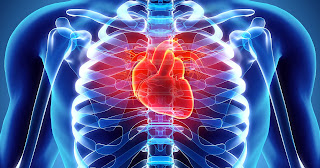Leading to chest pain (angina) or a heart
attack. Heart failure occurs when the heart is unable to pump enough blood to
meet the body's needs, often due to damage from a previous heart attack or
other conditions. Arrhythmias are abnormal heart rhythms that can be harmless
or life-threatening, depending on the type and severity. Valvular heart disease
involves damage or malformation of one or more of the heart valves,
which can
lead to regurgitation (backward flow of blood) or stenosis (narrowing).
Peripheral arterial disease affects the arteries outside of the heart, most
commonly in the legs, and can cause pain or cramping during activity due to
reduced blood flow. CVD is a leading cause of death and disability worldwide,
with risk factors including high blood pressure, high cholesterol, smoking,
obesity, physical inactivity, and diabetes. Treatment may involve lifestyle
changes, medications, and procedures such as angioplasty or bypass surgery.
Symptoms:
1. Fatigue:
Feeling tired or exhausted, even after a good night's sleep.
2. Insomnia:
Difficulty falling asleep or staying asleep.
3.
Irritability: Feeling easily annoyed or angered.
4.
Depression: Feeling sad, hopeless, or losing interest in activities once
enjoyed.
5. Anxiety:
Feeling nervous, worried, or fearful.
6. Memory
problems: Forgetfulness or difficulty concentrating.
7. Physical
symptoms: Headaches, muscle aches, and stomach problems.
Causes:
1. Stress:
Chronic stress can lead to the release of stress hormones, which can disrupt
sleep patterns and cause fatigue and irritability.
2. Mental
health disorders: Depression, anxiety, and other mental health disorders can
cause symptoms such as insomnia, fatigue, and memory problems.
3. Sleep
disorders: Conditions such as sleep apnea, insomnia, and restless leg syndrome
can disrupt sleep patterns and cause symptoms such as fatigue and irritability
during the day.
4. Medical
conditions: Certain medical conditions such as thyroid disorders, diabetes, and
heart disease can cause symptoms such as fatigue and memory problems.
5.
Medications: Some medications can cause side effects such as drowsiness,
fatigue, and memory problems. It's essential to talk to your healthcare
provider about any medications you are taking that may be causing these
symptoms.
Diagnosis and
Tests
Diagnosis and
tests are essential steps in identifying and managing various health
conditions. Here are some common diagnostic procedures and tests: Wellsun
Medicity Super Speciality is having all advanced digenetic Machine and more
than 12 year expertise Cardio Team,
1. Physical
Examination: A physical examination is the first step in diagnosing any health
condition. The doctor will examine your body, check your vital signs, and ask
questions about your symptoms and medical history.
2. Laboratory
Tests: Laboratory tests involve analyzing samples of blood, urine, or other
body fluids to identify the presence of specific substances, cells, or
organisms. These tests can help diagnose diseases such as diabetes, cancer, and
infections.
3. Imaging
Tests: Imaging tests use technology such as X-rays, CT scans, MRI scans, and
ultrasound to create images of the inside of the body. These tests can help
diagnose conditions such as bone fractures, tumors, and heart problems.
4. Endoscopy:
Endoscopy involves inserting a flexible tube with a camera into the body to
examine internal organs or tissues. This test can help diagnose conditions such
as stomach ulcers, colon polyps, and lung diseases.
5. Biopsy: A
biopsy involves removing a small sample of tissue from the body for examination
under a microscope. This test can help diagnose conditions such as cancer,
infections, and autoimmune diseases.
6.
Electrocardiogram (ECG): An ECG is a test that measures the electrical activity
of the heart. This test can help diagnose conditions such as heart attacks,
arrhythmias, and heart disease.
7.
Spirometry: Spirometry is a test that measures lung function by measuring how
much air you can breathe in and out of your lungs. This test can help diagnose
conditions such as asthma and chronic obstructive pulmonary disease (COPD).
8.
Mammography: Mammography is a test that uses X-rays to examine the breasts for
signs of breast cancer or other breast diseases. This test is recommended for
women over the age of 40 to screen for breast cancer.
9. Colonoscopy:
A colonoscopy is a procedure that uses a flexible tube with a camera to examine
the inside of the colon for signs of colon cancer or other colon diseases. This
test is recommended for people over the age of 50 to screen for colon cancer.
10. Psychological
Tests: Psychological tests are used to assess mental health conditions such as
depression, anxiety disorders, and cognitive disorders like Alzheimer's disease
or dementia. These tests may include questionnaires, interviews, or cognitive
assessments.
#neonatology
#pediatricscardiothoracic #surgeryheart #surgerywellsun#medicity #neurosurgery
#traumamanagement #wellsunmedicity #obstetrics &gynaecology
#wellsunmedicitynephrology #wellsunmedicityOral #Maxillofacialoralsurgery
#surgeonoral #surgerycardiology #cardiologyheartdisease #symptomsheart
#Cardiopalpitationstreatment,
Address:
Wellsun Medicity Multispecialty Hospital
www.wellsunmedicity.com
8-B/NH-5, Vrindavan Yojna,
Shaheed Path,Lucknow - 226029
+91-








